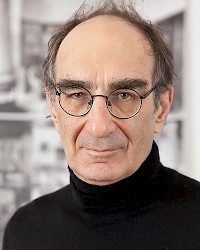Vita
Dr. Victor Mazin, Ph.D., practicing psychoanalyst, born in Murmansk, Soviet Union, in 1958. Graduated from Smolensk Pedagogical Institute, Department of Natural Sciences (1981), and East-European Institute of Psychoanalysis (1999). As associate professor and head of the Department of Liberal Arts and Sciences at the State University of Sankt Petersburg, Victor Mazin focuses his research and teaching on theory of cinema and history of avant-garde cinema.
Dated from 2017
Fields of research
psychoanalysis, media theory, philosophy.
IKKM Research Project
The Influencing Machine
The subject matter of The Influencing Machine Project is on the dialectical crossroads of discourses on psyche, techniques, and body. The principle question of the project is what kind of the influencing machine we might have today in the time of digital revolution and society of control? And an additional question is: what are the conditions of concretization of this possible third influencing machine?
To answer these questions we shall analyze the two influencing machines existed in human imagination and described in the accounts of the psychiatrists and psychoanalysts. Both machines have marked the turning points in human history in terms of radical changes in media, technology, and ideology (in a broad sense including science, ideas, politics). If the first machine is connected with the French revolution, industrial revolution, and the beginning of Classical Modernity; then the second one witnesses the radical change in culture in the beginning of twenty century, the upcoming of the Late Modernity.
The first influencing machine which controls mind was experienced by a patient of Bedlam hospital, James Tilly Matthews, also known as Patient Zero. The machine was described in details in 1797 by Matthews to his psychiatrist, Doctor John Haslam who published his account about the case in the book Illustrations of Madness and supplied it with the drawings made by the patient. This influencing machine is known by the name of Air Loom, and it is supposed to be the first device specially constructed to control human mind and body. Air Loom works according to two discourses of the time – pneumatic chemistry and mesmerism. Air Loom belongs to the coming Modernity.
The second influencing machine is well-known due to Victor Tausk and his paper “On the origin of the “influencing machine” in schizophrenia” (1919). The Tausk’s patient, a Berlin student of philosophy Natalia A., described her machine in terms of the era of the media and technology radical change. The electric machine is operated by the gang of doctors who control her thoughts, feelings, body. Her hallucinations are described as cinema projections.
After analysis of two influencing machines appeared in XVIII/XIX and in XIX/XX we come to the efforts to understand the conditions for the third machine (XX/XXI). The principle condition would be the transition from biopower (Michel Foucault) to psychopower of hyperindustrialization (Bernard Stiegler).
Recent Publications
"Slavoj Žižek auf einer anderen Bühne" //Žižek S. Der göttliche Todestrieb. Wien-Berlin: Turia + Kant, 2016.—Ss.11-22.
“Kettenbriefe: π oder… Freud, Fliess, Schreber, Cohen, Dupin, Lacan, Markov…”//Sendungen. Berlin/Bielefeld: [transcript], 2009.—Ss.63-102.
“Charmed Stranger”//Transmission Annual, #1, 2010, Sheffield, UK.—Pp.150-161.
"The Meaning of Money: Russia, the Ruble, the Dollar and Psychoanalysis" // New formations : a journal of culture, theory, politics, #72. London: Lawrence & Wishart, 2012.—Ss.47-64.
